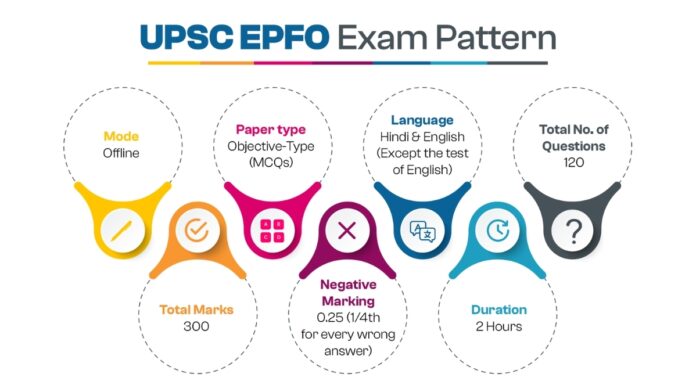Preparing for the UPSC EPFO exam can be tough, particularly when you wish your plan to be practical and effective. The first big step is knowing how to prepare for UPSC EPFO exam.
UPSC EPFO is a very competitive exam and requires a command over a wide subject range. You should be clever and organized in terms of preparation, more so when you are juggling a job or other duties.
For that, you must know the UPSC EPFO syllabus to plan a focused timetable. We will give you a step-by-step plan to assist you in structuring your UPSC EPFO preparation on a daily and weekly basis.
Step 1: Understand the UPSC EPFO Syllabus Thoroughly
Take a look at the syllabus before you plan how to prepare for the UPSC EPFO exam. In the UPSC EPFO syllabus, topics are as follows:
- General English
- Freedom Struggle of India
- Current Affairs
- Indian Polity & Economy
- The General Accounting Principles
- Industrial Relations & Labour Laws
- Computer Applications/General Science
- General Mental Ability and Quantitative Aptitude
- Indian Social Security
Find out your weaknesses and strengths in the subjects. This assists in providing more time to the more difficult areas
Step 2: Divide your Day as per your Profile
Your daily UPSC EPFO preparation schedule can vary, whether you are a working professional or a full-time aspirant.
For Working Professionals:
- Morning: 6:00 AM – 8:30 AM (Subject 1)
- Evening: 8:00 PM – 11:00 PM (Subject 2/Revision/Practice)
- Study Duration: 5-6 hours.
For Full-Time Aspirants:
- Morning: 8:00 AM – 10:30 AM (Subject 1)
- Afternoon: 12:00 PM – 2:30 PM (Subject 2)
- Afternoon: 5:00 PM – 8:00 PM (Revision/Practice)
- Study Duration: 7-8 hours
Step 3: Coverage of the UPSC EPFO Syllabus: Weekly Schedule
You must have a well-organised plan for preparing for the UPSC EPFO.
Month-wise Subjects Allocation Plan
- Weeks 1-3: Accountancy and Quantitative Aptitude
- Weeks 4-5: Social Security and Logical Reasoning
- Weeks 6-7: Indian Economy and General English
- Weeks 8-10: Indian Culture, History, and Industrial Relations
- Weeks 11-13: Computer Awareness, Governance and Constitution, General Science, Statistics
Every week, alternate subjects that you study daily, one in the morning, one in the evening. This adds diversity and prevents burnout.
Step 4: Ideal Daily Study Plan
Keep your timetable flexible according to your energy levels, but aim for:
First Session: When your mind is fresh, concentrate on a difficult or new topic.
Second Session: Pick up a related topic or go to revision.
Third Session (if feasible): Try a mock test, work through some past year’s papers, or practise some multiple-choice questions.
Your day could look like this:
- Indian Polity/ Accountancy: 2 hrs (Morning)
- General English/Quantitative Aptitude: 2 hrs (Afternoon/Evening)
- Mock test/Revision/Current Affairs: 1.5 hrs (Evening/Night)
Step 5: Revise and Practice
- Devote at least one session a day to revision of topics which have already been covered.
- Take notes when reading a topic and update them regularly.
- Take a mock test weekly or solve a past year paper. Analyze mistakes to improve poor subjects.
Step 6: Focus on Health and Breaks
Your UPSC EPFO preparation should also include rest. Take breaks after each session, hydrate yourself and include light exercise or walk.
This keeps your mind alert and reduces burnout.
Step 7: Useful Tips to Maintain Your Schedule
- Keep realistic goals on a daily basis. There is no need to hurry. Understand concepts.
- Remember to check your progress regularly (once every Sunday) and adjust the plan, when necessary.
- Avoid distractions. Study in a silent place and turn off your phone.
- In case you miss a target one day, then you should make up by using your time better in the following two days.
- Join doubt clearance and motivation online study groups or discussion forums.
Step 8: Go with Credible Sources
- Use credible books and web-based portals recommended by toppers.
- Do not have multiple sources for a single topic in your study plan.
- For current affairs, just stick to one good magazine/newspaper.
Step 9: Smart Use of UPSC EPFO Syllabus
Use the syllabus whenever you get lost. It serves as your guide and helps you know what is worth your focus and prevents wasting your time on the things that do not count.
Conclusion
The requirement to crack the UPSC EPFO exam is how you organize your daily UPSC EPFO study routine and follow the UPSC EPFO syllabus.
By taking a balanced approach, i.e. studying regularly, revising concentratedly, practicing and taking care of yourself, you will gradually come closer to your goal. Wishing you all the best!










